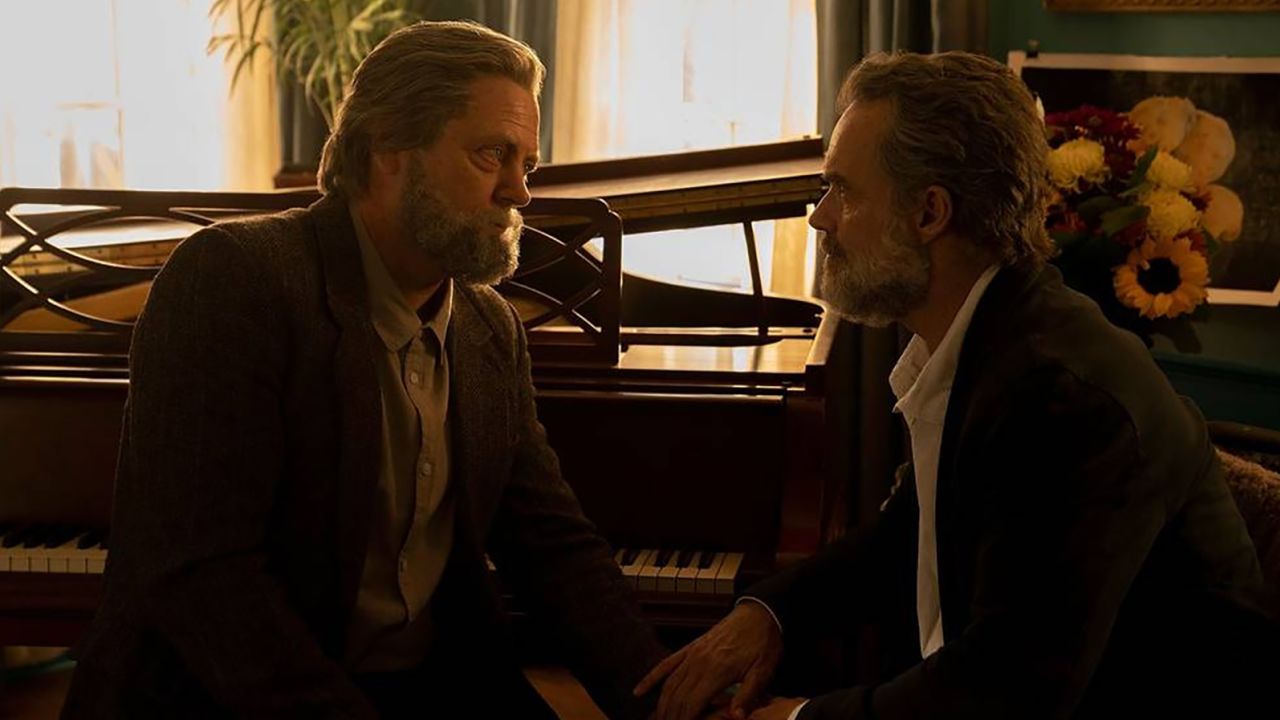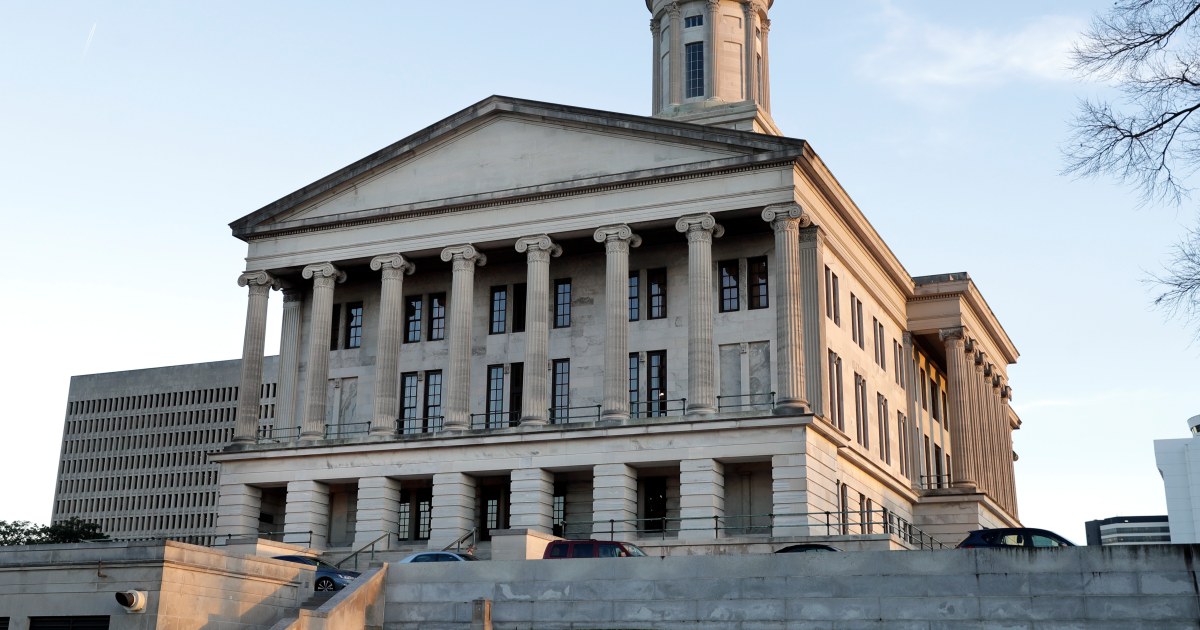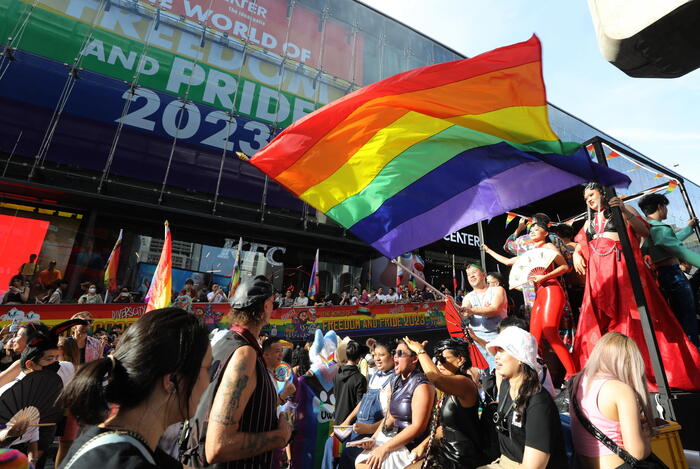How were the clicker sounds for "The Last of Us" created?
2:07
Editor's Note:
This story contains "spoilers" for episode 3 of HBO's "The Last of Us."
(CNN) --
In the video game "The Last of Us," the most we get to see of Frank's character is his dead, decomposing body hanging from the ceiling of an abandoned residence.
Bill, a rude doomsday prepper, is stunned to find her body: they were partners, Bill says.
But he doesn't take long to put Frank's body down and move on.
When "The Last of Us" came out in 2013, that's all Bill and Frank were: former "partners" who couldn't survive the apocalypse together.
(Players of the game could find a note that Frank left for Bill, in which he said that he hated him to death.)
Review of the third chapter of "The Last of Us": it aims to be one of the best television episodes of 2023
In the HBO television adaptation, the years-long relationship between Frank and Bill becomes the focus of the third episode of the series, in which their apocalyptic love story is depicted in a way unique to video game and story adaptations. dystopian
Their ending is based on the conditions that Bill and Frank put on themselves.
It is a bittersweet and moving episode.
(HBO and CNN share parent company, Warner Bros. Discovery.)
The episode, "Long, Long Time," marks the biggest departure yet in a series that has otherwise stuck closely to its source material.
The relationship between Bill and Frank is not the only homosexual love story to appear in "The Last of Us" (and, mild "spoiler", it won't even be the last of this first season of the adaptation).
But the response, both among first-time viewers and devoted fans of the game, has been mostly enthusiastic.
advertising
"I couldn't have imagined a more beautiful departure from the game's canonical content," says Nic Sam, a writer for the lesbian pop culture website Autostraddle, who has long adored the game.
"I'm replaying the game as I watch the series, and after watching this episode, I know I'm going to emotionally connect with Bill even more than I have on previous occasions."
Happy endings are very rare in apocalyptic narrative, especially in "The Last of Us."
But giving one to Bill and Frank, whose story ends in an unresolved tragedy in the game, shows another side of life after the apocalypse, Sam told CNN, and the "series is stronger for it."
A love story of years unfolds in an hour
In-game, most of the story we get is the harsh note Frank leaves Bill, who is briefly devastated by Frank's harsh words, but goes on to get Joel and Ellie the help they need, never to mention more to his old partner.
His story in the TV adaptation isn't exactly an encounter: Frank (Murray Bartlett), a survivor from Baltimore, falls into a hole Bill dug to trap raiders and infected who stumble upon near his rural Massachusetts home.
When Bill (Nick Offerman) realizes that Frank is not sick, he must quickly adjust to the idea of helping another person after years of isolation.
They share a delicious meal prepared by the still reluctant Bill, while Frank is eager and giddy to eat dinner, shower and spend time with another human being.
Bill ends up letting his guard down.
(Co-creator Craig Mazin said on the series' official podcast that Frank is "smiling" during his first interaction with Bill because "
Their first kiss, shared after they both take turns playing Linda Ronstadt's "Long, Long Time" on Bill's antique piano, is less passionate than revealing: It's an exhale after years of holding your breath.
Frank never leaves after his chance meeting with Bill.
It's about two people who, in a world uncorrupted by brain-eating fungus, probably never would have met, let alone embarked on a nearly 20-year relationship, facing the end of time together.
Nick Offerman (left) and Murray Bartlett star as Bill and Frank, respectively, in an emotional episode of "The Last of Us."
Credit: Liane Hentscher/HBO
Most of the time audiences spend with Bill and Frank is delightfully slightly dystopian.
They run together, nearly in tears at the taste of the strawberries Frank planted by surprise.
They argue over trivial things, like embellishing abandoned storefronts.
We see Joel and Tess having lunch with Bill and Frank;
Frank is elated to have company for the first time in years while Bill keeps his gun on the table.
After all these years of surviving (and at least once close), Frank is still sick with an unnamed human disease.
He asks Bill to prepare a deadly cocktail before the couple have one last "good day", culminating in a private wedding ceremony between the two.
(Viewers pointed out that, in the timeline of "The Last of Us," same-sex marriage had not been legalized in the US at the time the Cordyceps fungus took over.)
And then, after drinking adulterated wine, they retire to their bed, where they die.
The series lets the story of Bill and Frank stand on its own
Through Bill, we see an alternate path that Joel's life could have taken, if Joel was able to open up to the people who care about him.
Bill is totally transformed by his love for Frank, and the two keep each other alive in more ways than one.
But Bill and Frank don't exist solely to add depth to the show's straight lead.
Their story is entirely contained in one episode, and it doesn't play much into Joel and Ellie's journey.
It's a long-awaited expansion to a part of the story that fans of the game have fantasized about for years.
Valerie Anne, who streams on Twitch as PunkyStarshine and is wrapping up the series for Autostraddle with Nic Sam, thought the new additions to the Bill and Frank story were a definite improvement over the game.
He told CNN that while playing the game for the first time, his "gaydar" went off when Bill mentioned his "partner," but when he read Frank's suicide note, he wondered if he hadn't got it wrong: maybe the couple they were just business partners and nothing more, he thought.
Frank and Bill share an emotional last supper in the third episode of "The Last of Us."
Credit: Liane Hentscher/HBO
"I'm delighted that the series has taken care not only to give Bill and Frank a beautiful love story, but to make Bill a character who deserves it," she told CNN.
"In the game he's just a surly guy, and if there was a sweet center under all those layers of bitterness, we didn't get to see it."
In the game, Bill falls out with Ellie after Joel and his ward meet with the coach.
Her tête-à-tête does not appear in the series, Bill is dead before Ellie enters her house on screen, and Valerie Anne said that she missed seeing Ellie's facets light up through of her interactions with Bill.
But overall, she said, letting Bill and Frank have their own episode, without the burden of plot exposition, was a generous reward for viewers.
"I thought it was a beautiful snapshot of what 20 years of a pandemic might have been like for some people," he said.
"Not everyone runs from clickers at every turn or burns bodies for scraps of paper so they can get some food."
Some critics found the episode trope-laden or insincere
The episode also had its critics.
In his review, writer-filmmaker Juan Barquin stated that the sudden turn toward straight-out romance in an otherwise bleak series "feels fundamentally opposed to the world that (co-creator Neil) Druckmann has created", and that the episode was less a valuable narrative divergence than "an explicit attempt to seek praise".
Riley MacLeod of The Washington Post noted that, as moving as their story was for viewers, Bill and Frank kept "falling back on hackneyed gay death tropes": a gay man pushing a sick gay man into cause of an unknown illness, in a wheelchair;
an image that is often shown in the plots about HIV-positive characters, and they are apparently the "
Creators Mazin and Druckmann had been announcing the episode for weeks before the series premiered in mid-January.
In a lengthy article for the New Yorker, writer Alex Barasch claims that the creative team asked him more than once if he "cries easily" before watching the Bill & Frank episode (during a screening, Barasch wrote that Mazin, "smiling" , handed tissues to a crying HBO executive).
Mazin, in particular, has spoken about how proud he is of the episode and its changes, and to some critics, the response seemed a bit self-congratulatory.
Can the "zombie mushroom" Cordyceps from the series "The Last of Us" affect humans?
This is what science says about it
The 2013 game was the subject of controversy for its treatment of Bill, whose homosexuality is only briefly alluded to.
A reviewer for Logo TV wrote that the game reduced Bill to a "joke" after Ellie joked about a gay porn magazine she found.
Fanbyte reported Bill's casting in the television series as a "gay that (the series) will probably bury."
Even the game's lauded 2022 remake was a "reminder of the 'bury your gays' trope," The Gamer's Jade King said in an article that year.
(The "bury your gays" trope references the frequent murder of gay characters in the media.)
Watching Bill and Frank's love story unfold from start to finish, when in-game it seemed like an "afterthought," was a "universal improvement," King told CNN.
“Bill is left alone with the failure to keep Frank alive in the game, but here they die in each other's arms, content to have lived a full and loving life and to be able to go their own way,” King explains.
"It can almost be seen as a vindication of queer characters, who have been hurt so many times."
Even though, as a queer trans woman covering LGBTQ media, she's played through and seen plenty of similar stories, she found Bill and Frank's romance sincere, she said.
"I would normally steer clear of queer stories that glorify trauma and tragedy, but 'The Last of Us' has somehow deconstructed damaging tropes and turned them into a narrative that feels earned," King told CNN.
Episode 3 is a promising start to gay love stories to come
Revealing more about gay relationships to come in "The Last of Us" would spoil the rest of the series and its newly approved second season, which Mazin and Druckmann have said that it will likely follow the plot of "The Last of Us Part II."
But it bodes well for the rest of the series that the showrunners have been careful about telling queer stories, Valerie Anne said.
"To spend nearly two full decades with someone you love is a gift, and to get it in a time of so much death and destruction feels even more special, so it's really nice to see that happen for gay people," he told CNN.
Rewriting Bill and Frank's partnership makes the LGBTQ representation that follows all the more meaningful, as those stories and characters are no longer correcting what came before.
"The Last of Us Part II" was praised upon its release for the time it devoted to its central gay characters (as well as the addition of a trans character who plays a pivotal role).
Their story gets hours of space that Bill and Frank's love only got a few seconds.
"'The Last of Us' has become an iconic example of queer representation in gaming, and for one of the most recognizable blockbusters to be so progressive in its intentions is a huge positive for this medium, even if it made some early mistakes. along the way," King said, noting that the series' third episode is proof that future episodes of the series will have the same nuanced approach to beloved LGBTQ characters.
The Last of Us










/cloudfront-eu-central-1.images.arcpublishing.com/prisa/2C5HI6YHNFHDLJSBNWHOIAS2AE.jpeg)



